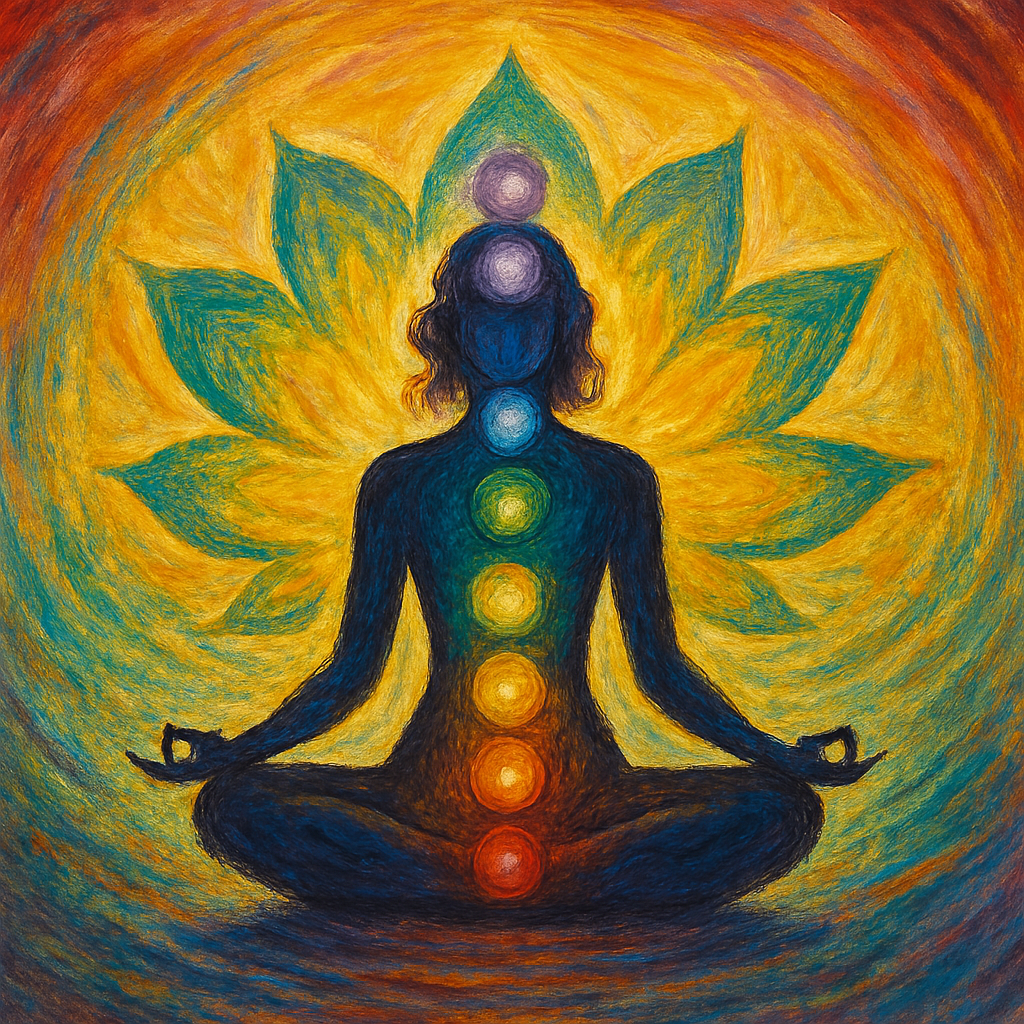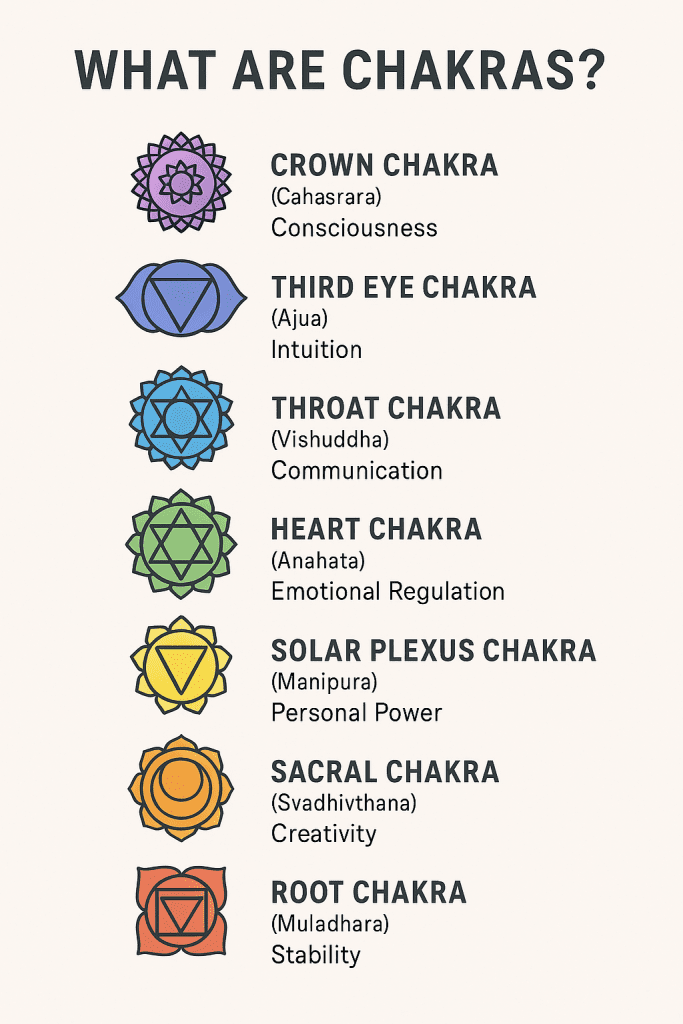
In the world of holistic healing, few practices have gained as much attention in recent years as chakra balancing. Rooted in ancient Eastern traditions, this practice is more than just spiritual wellness—it’s becoming an increasingly explored path to physical health, vitality, and overall well-being. But how exactly does aligning your energy centers translate into tangible physical benefits?
Let’s explore how chakra balancing works, why it matters, and what science and experience say about its effects on the body.
What Are Chakras, and Why Do They Matter for Physical Health?
Chakras are believed to be spinning centers of energy, running from the base of the spine to the crown of the head. Each of the seven primary chakras is connected to specific organs, glands, and bodily functions—meaning that imbalances in your energy flow may correspond to physical symptoms such as fatigue, digestive issues, or immune suppression.
Root Chakra (Muladhara): Linked to the adrenal glands, lower back, and legs; influences stability and survival.
Sacral Chakra (Svadhisthana): Governs the reproductive system, kidneys, and creativity.
Solar Plexus Chakra (Manipura): Tied to digestion, metabolism, and personal power.
Heart Chakra (Anahata): Connected to the heart, lungs, and emotional regulation.
Throat Chakra (Vishuddha): Relates to the thyroid gland and communication.
Third Eye Chakra (Ajna): Influences the brain, pituitary gland, and intuition.
Crown Chakra (Sahasrara): Governs consciousness, nervous system, and spiritual connection.
When these chakras are balanced and energy flows freely, the body’s systems—nervous, endocrine, immune can function more effectively.

Physical Benefits of Chakra Balancing
Chakra work is often misunderstood as purely emotional or spiritual, but its benefits ripple through every layer of your being. Here are some of the most prominent ways it can enhance physical health:
1. Boosts Energy and Vitality
Blocked chakras can cause energy stagnation, which may manifest as chronic fatigue or low motivation. When your energy centers are aligned, your prana—or life force—flows more efficiently, often resulting in a noticeable lift in stamina and daily energy levels.
2. Improves Immune Function
Several studies suggest that stress and emotional imbalance weaken the immune system. Chakra balancing techniques—like meditation, breathwork, and sound therapy—help calm the nervous system, reduce cortisol levels, and enhance the body’s natural defense mechanisms.
3. Supports Organ Health
Each chakra is tied to specific organs. For example, a balanced solar plexus chakra is often linked to better digestion, while heart chakra work may contribute to improved respiratory health. By nurturing these energy centers, you support the optimal function of your internal systems.
4. Relieves Chronic Pain and Tension
Energy blockages often accumulate in the form of physical pain—especially in the back, shoulders, or joints. Chakra alignment can help release this tension. Sound healing, Reiki, or crystal therapy are commonly used to target these areas and restore balance.
5. Enhances Sleep and Hormonal Balance
Because chakras align closely with the endocrine system, balancing them may regulate hormones that affect sleep, mood, and metabolism. Techniques like Kundalini yoga and focused breathing have shown potential in calming overactive minds and promoting restful sleep.
How Chakra Balancing Works: Techniques That Target the Body
While chakra therapy might sound abstract, it uses very practical tools to create real shifts in your physical and energetic body. Some popular techniques include:
Meditation & Breathwork: Directs awareness to specific chakras, calming the nervous system and enhancing circulation.
Yoga Poses: Physical postures like Cobra (Heart Chakra) or Warrior (Root Chakra) stimulate related organs and glands.
Sound Therapy: Frequencies from Tibetan bowls or tuning forks are used to clear blockages and soothe inflammation.
Crystal Healing: Stones like amethyst (Third Eye) or citrine (Solar Plexus) are placed on the body to harmonize vibrational frequencies.
Energy Healing (Reiki): Practitioners channel universal energy through the hands to restore balance and vitality.
These methods not only relax the mind but also signal the body to enter a healing state—one that supports cellular repair, detoxification, and regeneration.
Is There Scientific Support?
While chakra systems are not yet fully embraced in conventional medicine, growing research on integrative therapies suggests real physiological impacts. Studies on yoga and meditation—cornerstones of chakra work—have demonstrated:
Lowered blood pressure and heart rate
Improved blood sugar and insulin sensitivity
Enhanced immune markers
Decreased symptoms of anxiety, depression, and chronic pain
Furthermore, aligning chakra locations with major endocrine glands and nerve plexuses hints at a deeper anatomical connection that modern science is only beginning to explore.
When to Consider Chakra Healing
If you experience any of the following symptoms without a clear medical cause, your energy flow may be out of balance:
Persistent fatigue or low energy
Unexplained physical pain or discomfort
Frequent illness or weakened immunity
Digestive or reproductive issues
Sleep disturbances or hormonal irregularities
Incorporating chakra practices into your routine—whether through guided meditation, energy healing sessions, or yoga—can offer a gentle, holistic way to regain your vitality.
Final Thoughts: Energy Flow = Health Flow
Chakra balancing isn’t just a spiritual ritual—it’s a practical approach to restoring harmony across your body’s systems. By aligning your energy centers, you open the door to deeper healing, more vibrant health, and a greater sense of overall well-being.
As science continues to explore the mind-body connection, one thing becomes increasingly clear: when energy flows freely, the body thrives.
FAQs
No, but it can be a complementary tool alongside traditional medical care.
Once a week is a good start, but listen to your body—it’ll tell you what it needs.
Fatigue, anxiety, physical tension, and feeling “off” are common clues.
Absolutely. Think of it like energy hygiene—belief isn't required, just openness.
Generally, no. But if you uncover intense emotions, consider support from a trained therapist or healer.




